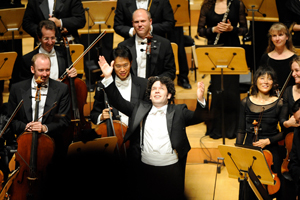There was Van Cliburn in 1958, Lenny (Bernstein, of course) from the 60s til his death in 1990, and now it's the Venezuelan Wunderkind Gustavo Dudamel - a genuine phenom who is transcending the realm of classical music and crashing into the broad public consciousness.
You need proof?
Then go beyond the gala opening concert Thursday at Disney Hall -- with video cameramen positioned discreetly onstage for future world-wide screenings -- where the Los Angeles Philharmonic's new podium chief, together with his 100 musicians, bedazzled both an elite indoor crowd, sold to the walls and thronged with celebrities, and the outdoor Music Center Plaza revelers watching it all on a Jumbotron, with additional flat screens scattered about.
In fact, five days earlier 18,000 fast-footed folks who had, two months ago, snapped up free tickets, came to a Hollywood Bowl community concert that featured local jazz and pop groups, with Dudamel leading his new orchestra in Beethoven's Ninth and ending with the ubiquitous fireworks.
Also, check out most print publications and online enterprises (google him, why don't you?) to find lengthy pages on the man who's bringing Mahler to the masses. And look for the telecasts: "60 Minutes" last season with a revisit coming up, as well as features on the other national networks and PBS.

Okay, okay. You're convinced. He's where he is because of a mysterious thing called charisma, which goes quite beyond being gifted, though he is that without question.
So there we were at the glittering music palace called Disney as the VIP audience hushed to a pindrop awaiting the 28-year-old conductor's appearance from the wings. It came, he walked briskly but un-self-importantly, while rewarding folks out front with sweet smiles and then went about his business.
First, a world premiere: John Adams' "City Noir," which, if you had not read the program note, would be instantly recognizable as an extrapolation of scores written for Hollywood's film noir genre so popular in the 40s and 50s - with their vaguely menacing, lonely sounding episodes of melancholy that swirl with romantic longing. The three-movement, half-hour work is a kind of "Blues in the Night" alternating with eerie, shimmering parts, intricate collisions of winds and strings, accented at times, with Adams' signature: those warmly bouncy, minimalist flirtations.
Dudamel took the piece vigorously in hand, in other words, he gave it an exhaustingly thorough workout and the players more than obliged.
But what most of us were really anticipating was the Mahler First Symphony - which Dudamel cut his teeth on. It is the most innocent work of a composer whose music plumbs the vast emotional range of human experience. As with other great conductors this young maestro senses, seizes on and communicates every scintilla of its pastoral joy, lugubrious shtetl memory, piquant nostalgia and sky-touching exhilaration, which is not to say that he slights delicacy or subtlety.
It's all there. And it's there because he's in constant contact with the musicians. As though to say, "I'm on the ride of my life and I'm taking you with me. We're on this ride together."
That may just be what constitutes his charisma. It's not a solo thing. He's a communitarian. (Some would ridiculously disparage him as a socialist? --coming from a social democracy that provides free music education so that the poor can also benefit?)
What we heard Thursday in the Mahler, as well as in his previous appearances at Disney, was the Dudamel stop-and-consider moments. As if to underline a word by spelling it aloud he would elongate a passage, stretch it out as though teaching it - both to the players and the audience. And then, in its repeat, breathlessly speed it up as though to say, "Yes, now we know it intimately. Here is its ultimate impact."
That's one reason his and the orchestra's music-making is so vibrant, so alive. His body uncannily serves as a vessel for a work's expression at every juncture. When he's urging elasticity in the playing, for instance, his gesturing hands illustrate it. Why, a hearing-impaired person could imagine the music just from his depictions. And, naturally, there's no such thing as just beating time.
At the end, shiny purple and gold mylar confetti rained down, but the audience, no matter how wild it grew in its 12-minute ovation, did not get a hero's response. Because, as any observer of Dudamel knows, he doesn't do solo bows. No hand to heart. No show of the warrior back from the front, wiping a sweaty brow, retreating to the wings as one who has given his all.
Instead, this hero is a man of the people. And his people are his players. So the first bows are to the orchestra, his back to the audience. The podium? That's a thing to step across like a stepping stone, or bounce from, in order to join his musicians, as one of them, standing on the stage floor, not a smidge in front, but alongside them.
And, most of all, stringing his way through the rows of music stands, he rouses the various soloists to take bows. About this, he is very particular. And when he ended the ovations, Dudamel motioned to the audience, "have a drink now, folks."